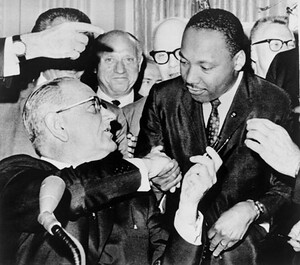The Civil Rights Act of 1964: Breaking Down Barriers

The Civil Rights Act of 1964 stands as one of the most significant legislative achievements in American history, fundamentally transforming how Americans could access public spaces and opportunities. The act outlawed discrimination based on race, color, religion, sex, and national origin and prohibited unequal application of voter registration requirements, racial segregation in schools and public accommodations, and employment discrimination. This landmark legislation emerged from the intense civil rights activism of the early 1960s, particularly the Birmingham campaign led by Rev. Fred Shuttlesworth and the Southern Christian Leadership Conference.
The legislation was proposed by President John F. Kennedy in June 1963, but after Kennedy was assassinated on November 22, 1963, President Lyndon B. Johnson pushed the bill forward. The path to passage wasn’t easy though. The longest continuous debate in Senate history took place in 1964 over the Civil Rights Act, with southern Democrats attempting to kill the bill through filibuster tactics. On June 10, a coalition of 27 Republicans and 44 Democrats ended the filibuster when the Senate voted 71 to 29 for cloture, marking the first time in its history that the Senate voted to end debate on a civil rights bill.
The Voting Rights Act of 1965: Securing the Ballot

Just one year after the Civil Rights Act, America witnessed another pivotal moment in civil rights history with the Voting Rights Act of 1965. One of the most important pieces of civil rights legislation in U.S. history, the Voting Rights Act was signed into law in 1965 by President Lyndon B. Johnson. The act directly addressed the voting discrimination that the Civil Rights Act of 1964 had left largely untouched.
It outlawed the discriminatory voting practices adopted in many southern states after the Civil War, including literacy tests as a prerequisite to voting, as African Americans in the South faced tremendous obstacles to voting, including poll taxes, literacy tests, and other bureaucratic restrictions. The catalyst for this legislation came from the violent confrontations in Selma, Alabama, where County Sheriff Jim Clark’s police force violently resisted African-American voter registration efforts. Just eight days after Martin Luther King, Jr. led a peaceful civil rights march in Selma, Alabama, President Lyndon B. Johnson announced his intention to pass a federal Voting Rights Act.
The Enforcement Mechanisms That Made Change Possible

What made the Civil Rights Act of 1964 and Voting Rights Act of 1965 truly transformative wasn’t just what they prohibited, but how they were enforced. The Voting Rights Act gave the federal government the authority to send federal registrars and observers to register new voters and oversee elections, and required pre-clearance of new election-related legislation in specific locations with a history of voting rights discrimination. This federal oversight represented a dramatic shift in how civil rights would be protected.
Section 2 prohibited federal, state, and local governments from implementing voting rules that “results in the denial or abridgement of the right of any citizen to vote on account of race or color,” while Section 5 created a special system of “preclearance,” where certain jurisdictions were not allowed to make any changes in their voting laws without prior approval from the U.S. District Court for D.C., or the Attorney General. These enforcement provisions became the teeth that gave civil rights laws their bite.
The Expanding Definition of Civil Rights

The success of the 1964 and 1965 acts opened the door for broader interpretations of civil rights and equality. The civil rights struggle served as a blueprint and inspiration for many other groups seeking equality and access, and the act and its enforcement continue to prompt new debates about what equality means, what government can do to promote it, and how ordinary Americans can continue to achieve it. Women, disabled Americans, and other marginalized groups began using the framework established by these laws to push for their own protections.
The Civil Rights Act secured African Americans equal access to restaurants, transportation, and other public facilities, enabled blacks, women, and other minorities to break down barriers in the workplace, and made access to equal education a reality for many Southern and Northern African Americans who began attending integrated schools. The ripple effects of these laws extended far beyond their original scope, fundamentally reshaping American society.
Modern Challenges to Civil Rights Progress

Despite these historic achievements, civil rights remain under siege in the 2020s. Racism, anti-immigrant sentiments, and threats to democracy remained pressing human rights problems in the United States in 2023, with at least 14 states passing laws in 2023 that make it more difficult to vote. The landscape of civil rights has become increasingly complex, with new forms of discrimination emerging alongside persistent historical inequities.
State-level lawmakers continued to undermine democracy by banning books and passing laws that restrict truthful classroom discussions of race, history, sexual orientation, and gender, with this censorship having the potential to undermine civic participation by erasing the galvanizing stories of ordinary citizens who organized to promote human rights. This type of crackdown has already been seen in 567 anti-critical race theory bills that were introduced in state legislatures in 2023.
LGBTQ+ Rights: A New Civil Rights Frontier

The fight for LGBTQ+ rights has emerged as one of the most contentious civil rights battlegrounds of the 21st century. Michigan is the only state where lawmakers adopted a comprehensive LGBT-inclusive nondiscrimination law in 2023, making it the 22nd state to do so, while the US has failed to enact comprehensive federal legislation that would expressly protect LGBT people from discrimination. This patchwork of state-level protections has created a complex legal landscape where rights vary dramatically by geography.
In the span of just two years, we went from tracking zero national anti-trans bills, up to an unprecedented 88 bills at the federal level in 2024, with legislation being considered across 49 states in 2025. As of August 2024, 26 states had passed bans on gender-affirming care, representing a significant rollback of civil rights protections for transgender Americans.
The Corporate Retreat from Diversity Initiatives

The business world has also seen a dramatic shift away from diversity and inclusion efforts that once seemed permanent. Research shows that major corporations such as Meta, Tesla, DoorDash, Lyft, Home Depot, Wayfair, and X have cut the size of their DEIA teams by 50 percent or more in 2023 alone, with DEI job postings falling by 43 percent as of July 2024. This corporate retreat from diversity initiatives reflects broader cultural and political pressures that have made civil rights advocacy more controversial in recent years.
The abandonment of these programs represents more than just corporate policy changes—it signals a fundamental shift in how American institutions approach questions of equality and inclusion. Companies that once proudly proclaimed their commitment to diversity are now quietly dismantling the very programs they once championed, often citing political pressure or changing business priorities.
Project 2025: The Conservative Response to Civil Rights

The conservative movement has developed comprehensive plans to roll back civil rights protections through initiatives like Project 2025. Project 2025 proposes that the Department of Justice (DOJ) should enforce civil rights laws only in the courts, eliminating important administrative tools to address discrimination, and would reassign prosecution of election related offenses from the Civil Rights Division to the Criminal Division. This represents a fundamental restructuring of how civil rights are enforced at the federal level.
The far-right extremist Project 2025 playbook seeks to dismantle bedrock civil rights protections that have advanced equality in America over the past 60 years, and if enacted, the far-right agenda would allow the federal government to effectively sanction injustice and lead to a resurgence of discrimination in public places. The scope of these proposed changes would effectively return civil rights enforcement to pre-1960s levels of federal involvement.
The 2025 Executive Order on “Merit-Based Opportunity”

The Trump administration’s return to power in 2025 has already begun reshaping civil rights policy through executive action. Executive actions revoked include Executive Order 12898 on environmental justice, Executive Order 13583 on diversity in the federal workforce, and Executive Order 13672 on equal employment opportunity. These reversals represent the most significant rollback of civil rights protections in decades.
The Federal contracting process shall be streamlined to enhance speed and efficiency, reduce costs, and require Federal contractors and subcontractors to comply with our civil-rights laws. However, critics argue that by eliminating diversity and inclusion requirements, these changes will actually reduce civil rights protections rather than enhance them.
State-Level Innovations in Civil Rights Protection

While federal protections face challenges, some states have expanded civil rights protections in innovative ways. Under Assembly Bill 3024, California’s civil rights law that prohibits hate violence now expressly protects people from being targeted with hateful materials like flyers or posters on their private property with the purpose of terrorizing them, with the state continuing to lead the charge in the fight for civil rights in 2025. These state-level innovations demonstrate how civil rights can evolve even in hostile federal environments.
California’s approach represents a new model for civil rights protection that focuses on emerging forms of harassment and intimidation. By explicitly protecting people from hate littering—the targeted placement of hateful materials on private property—the state has recognized that civil rights violations can take subtle but deeply harmful forms.
The Ongoing Struggle for Voting Rights

Voting rights remain one of the most contested areas of civil rights law. The movement for universal suffrage earned victories when New Mexico and Minnesota passed laws that allow individuals to vote upon release from prison, and a federal court overturned Mississippi’s lifetime voting ban for individuals convicted of some felony offenses. These victories represent important expansions of voting rights, but they occur against a backdrop of increasing restrictions in other states.
For the first time in US history, a former president faced significant sanctions, including criminal and civil charges, in part for his efforts to overturn the 2020 elections, a serious infringement of the right to vote. This unprecedented situation highlights how voting rights have become intertwined with broader questions about democratic governance and the rule of law.
The Future of Civil Rights Enforcement

Civil rights organizations are preparing for a challenging period ahead. The Leadership Conference on Civil and Human Rights, representing more than 240 national civil and human rights advocacy organizations, expressed grave concerns with pending appropriations bills and urged Congress to support additional funding of agencies charged with enforcing civil rights laws. These funding battles will determine whether civil rights agencies have the resources necessary to protect Americans from discrimination.
The Department of Education’s Office for Civil Rights needs substantially higher funding to fulfill its responsibilities at a time of increased complaints of discrimination in education, while the Department of Health and Human Services’ Office for Civil Rights has significant enforcement responsibilities made even more urgent by the COVID-19 pandemic. Without adequate funding, these agencies cannot effectively protect civil rights.
As we look toward the future, civil rights in America face both unprecedented challenges and new opportunities. The fundamental question remains whether the progress made since 1964 can be sustained and expanded, or whether we’re witnessing the beginning of a significant rollback of civil rights protections. What seems certain is that the struggle for equality continues, taking new forms but drawing on the same spirit of determination that drove the civil rights movement of the 1960s.






